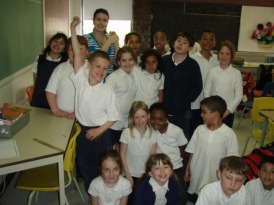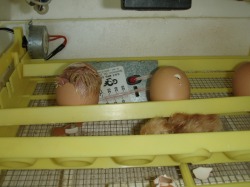First Field Experience
McGill First Field Experience Guidelines
- Become oriented to the school and to the functioning of the classroom through observation
- Assist with supervision functions within and outside the classroom
- Assist with the preparation, collation, and distribution of student resource material, and prepare materials for students
- Become familiar with classroom routines and implement some of them, e.g., take attendance, make announcements; introduce a lesson.
- Begin some limited instruction with individual students, or small groups of students at their work stations
- Team‐teach with the cooperating teacher
- Teach part of a lesson planned by the cooperating teacher.
For my first field experience I was lucky enough to be placed in Madame La France’s first grade french class. I was at Terry Fox School, which is a great school. During my stage, I really learned a lot from my Cooperative Teacher even only after 3 weeks. I had the time to observe her/take notes and she even had confidence in me to let me teach full lessons. It is only with practice and experience that you will improve on your teaching and from the first field experience I took initiative. Below I have included one of my observations I have made during the stage. It is about the importance of class and time management.
| focused_observation_of_the_teachers_approach_in_the_classroom.docx |
Second Field Experience
McGill Second Field Experience Guidelines
Week 1
Week 1
- Be introduced to the culture and community of the school;
- Shadow the cooperating teacher for approximately the first three days;
- Become knowledgeable about school routines, policies, schedules, programs and resources;
- Αssist the cooperating teacher in classroom activities and implement routines, e.g.,take attendance, make announcements;
- Assist with the preparation, collation, and distribution of student resource material, and prepare materials for students with the help of the cooperating teacher;
- Be assigned some preparation of a lesson(s) with help from the cooperating teacher;
- Teach part of that lesson preparation;
- Begin to team teach the lesson(s) with the cooperating teacher;
- Use the remainder of the time for additional preparation, supervision, extra-curricular activities, etc.;
- Work together with the cooperating teacher to do some corrections/grading;
- Μaintain established classroom routines with the help of the cooperating teacher;
- Take over an entire class or classes with the cooperating teacher largely present;
- Plan and teach entire lessons with the cooperating teacher out of the classroom for short periods;
- Gradually increase teaching load to approximately 40 – 50% of a full teaching load;
- Demonstrate satisfactory progress in all professional competencies appropriate to this field experience;
I really enjoyed my second field experience; once again I was placed with an amazing Cooperative Teacher called Melina. I was at Greendale Elementary which is a school I fell in love with. I had two classes one split 2/3 and a grade 3 class. My students were amazing. I have learned so much from them and also a lot from my CT. Melina has taught me that you can have fun while teaching. That it is ok to make jokes and have fun activities for the students to learn from. This I believe is the most valuable lesson she could have ever taught me. I learned that it is possible to be loved by the children (be their friends) but also have their respect at the same time. I was lucky enough to be part of a “chick project” in my stage. During the time I was there, we hatched chicks. Also another memorable experience I will never forget.
Below I have included my best lesson I feel I have done. It is a Language Arts lesson on contractions. Also I have included the song we sang together, and some worksheets.
| contractions_lesson_plan.doc |
Third Field Experience
McGill Third Field Experience Guidelines
Week 1
- Shadow cooperating teacher
- Help with classroom set up
- Attend meetings and workshops
- Observe cooperating teacher; become knowledgeable about school routines, policies, schedules, programs and resources, visit the library, resource room, and all other support offices.
- Assist cooperating teacher in classroom activities and implement routines, e.g., take attendance, make announcements, prepare and distribute materials
- Teach part of a lesson
- Begin team‐teaching
- Gradually take on solo teaching
- Integrate suggestions and techniques based on the cooperating teacher’s and upervisor’s feedback
- Use other time for preparation, marking, supervision, extracurricular activities, etc.
- Increase teaching to 40% to 50% of a full teaching workload and be responsible for planning, implementation and assessment.
- Continue to use other time for preparation, marking, supervision, extracurricular activities, etc.
Weeks 5‐10
- Show progress in preparation, implementation, management and professional qualities according to all 12 professional competencies
- Increase the teaching load to approximately 60 – 75% of a full teaching workload
- Continue to integrate suggestions and techniques based on the cooperating teacher’s and supervisor’s feedback
- Transition period as student teacher transfers class back to CT
- Students will be available after the end of the FE assist with report cards or parent teacher conferences if required.
For my Third Field Experience, I was lucky enough to be placed in the same school and with the same teacher as my second stage. What was great about this field experience is that I looped with my grade 3 classes. Looping was a great experience for me because I was able to start my year without having to connect with the students. Since I was with them already, getting to know them was not the primary focus at the beginning of stage. I already knew their strengths and weaknesses and was able to start strong right from the start. I was glad to see that my students were really happy to have me in their classroom again. Also, to be in Melina’s class again is always a pleasure and I was sure to learn a lot more from her. During this field experience, I was able to gain a lot of confidence in my teaching and have developed many different skills. One thing I am most proud of, is that I always had full control and attention of the class. Teaching grade 4 for me was lots of fun. I really enjoyed this grade because they still look up to you, and are a lot more independent than the younger grades. I was able to come up with some really great activities for them to do. I also did my own unit for over a three week period. My unit was on pioneers. The students learned about the lives of the early settler children, from 1700 to the late 1800s. In this unit, the students compared their daily lives to the lives of early settler children.I chose this topic, because I wanted the students to learn about how children use to live in the past and appreciate how we live today. We did many fun activities such as making butter, comparing routines with a Venn diagram, read a story and made a wheel book, etc. Ironically one day we had a blackout for half a day, and pretended to be settler children (having no electricity). My unit was very successful. In the end, the students really learned to appreciate the simple things we have today (electricty, transportation,etc..) and saw things in a different light.







